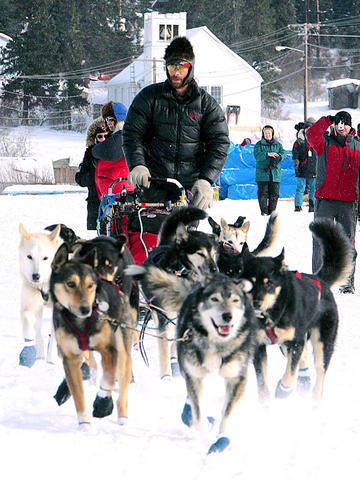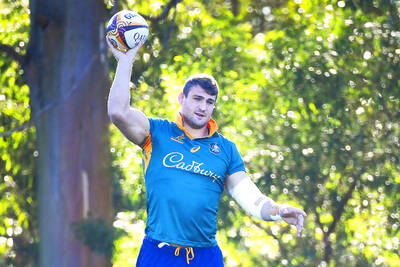With a sneaky move near the end of the 1,770km route in Alaska, Lance Mackey burst past four-time champion Jeff King to win his second straight Iditarod Trail Sled Dog Race yesterday.
It was a difficult race, beset with problems and the challenge of competing with King and his faster and better-rested dog team, Mackey said.
The crucial move, he told reporters, was quietly departing Elim, an Inupiat Eskimo village and race checkpoint 198km from the finish line in Nome, while King snoozed.

PHOTO: AP
"I'm not much to brag very often but, damn, I'm going to do it this time. I worked for that one," Mackey, a commercial fisherman, said after reaching Nome in nine days, 11 hours, 46 minutes and 48 seconds.
For his victory in the world's most famous sled-dog race, Mackey took home US$69,000 and a new truck, part of a total purse of about US$1 million. Live coverage of his finish was broadcast on statewide television.
Mackey said he drank two big cups of coffee in Elim, hung up his gear and pretended he was going to sleep until King dozed off.
"I lay there jittering, basically, for about 15 minutes until I heard him start snoring, then I slowly got out my stuff, snuck outside, strapped it on the top of my sled," he said. "I just took off walking down the road."
King woke up and tried to chase him but was about an hour behind by then -- a margin Mackey maintained to the end.
The two had been running within minutes of each other since about the race's midway point, although King's dogs were faster and were getting more rest at checkpoints, Mackey said.
"I had to do something a little different," he said. "The move in Elim was old-school, but it was so old-school that they forgot about it. And I needed to pull something out of the bag."
A record 96 mushers started the Iditarod on March 1 in Anchorage. When Mackey crossed the finish line, 81 were still on the trail.
The race, now in its 36th year, commemorates a 1925 mission that sent medicine to Nome by sled-dog relay to combat a fatal diphtheria outbreak.
Two members of a media production crew working with organizers of the race were injured on Tuesday when their small plane crashed en route to a race checkpoint.
Alaska state police said that Tony Verano and Matt Peterson sustained injuries that were not life threatening when the Cessna 180 went down about 20km east of White Mountain, Alaska, 125km from the Nome finish line. The pilot, Kenneth Moon, was not hurt. No other people were on board.
Verano and Peterson work for Versus cable sports television channel, formerly known as the Outdoor Life Network, said Stan Hooley, executive director of the Iditarod Trail Committee. Versus is a national media partner with the Iditarod.
Moon was flying from the checkpoint at Koyuk to White Mountain when the plane crashed, police Sergeant Andrew Merrill said.

Tainan TSG Hawks slugger Steven Moya, who is leading the CPBL in home runs, has withdrawn from this weekend’s All-Star Game after the unexpected death of his wife. Moya’s wife began feeling severely unwell aboard a plane that landed at Taiwan Taoyuan International Airport on Friday evening. She was rushed to a hospital, but passed away, the Hawks said in a statement yesterday. The franchise is assisting Moya with funeral arrangements and hopes fans who were looking forward to seeing him at the All-Star Game can understand his decision to withdraw. According to Landseed Medical Clinic, whose staff attempted to save Moya’s wife,

Wallabies coach Joe Schmidt yesterday backed Nick Champion de Crespigny to be the team’s “roving scavenger” after handing him a shock debut in the opening Test against the British and Irish Lions Test in Brisbane. Hard man Champion de Crespigny, who spent three seasons at French side Castres before moving to the Western Force this year, is to get his chance tomorrow with first-choice blindside flanker Rob Valetini not fully fit. His elevation is an eye-opener, preferred to Tom Hooper, but Schmidt said he had no doubt about his abilities. “I keep an eye on the Top 14 having coached there many years

ON A KNEE: In the MLB’s equivalent of soccer’s penalty-kicks shoot-out, the game was decided by three batters from each side taking three swings each off coaches Kyle Schwarber was nervous. He had played in Game 7 of the MLB World Series and homered for the US in the World Baseball Classic (WBC), but he had never walked up to the plate in an All-Star Game swing-off. No one had. “That’s kind of like the baseball version of a shoot-out,” Schwarber said after homering on all three of his swings, going down to his left knee on the final one, to overcome a two-homer deficit. That held up when Jonathan Aranda fell short on the American League’s final three swings, giving the National League a 4-3 swing-off win after

Seattle’s Cal Raleigh defeated Tampa Bay’s Junior Caminero 18-15 in Monday’s final to become the first catcher to win the Major League Baseball Home Run Derby. The 28-year-old switch-hitter, who leads MLB with 38 homers this season, won US$1 million by capturing the special event for sluggers at Atlanta’s Truist Park ahead of yesterday’s MLB All-Star Game. “It means the world,” Raleigh said. “I could have hit zero home runs and had just as much fun. I just can’t believe I won. It’s unbelievable.” Raleigh, who advanced from the first round by less than 25mm on a longest homer tiebreaker, had his father